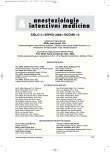-
Články
- Vzdělávání
- Časopisy
Top články
Nové číslo
- Témata
- Kongresy
- Videa
- Podcasty
Nové podcasty
Reklama- Kariéra
Doporučené pozice
Reklama- Praxe
UEMS
Vyšlo v časopise: Anest. intenziv. Med., 19, 2008, č. 4, s. 242
Kategorie: Zprávy ČSIM
UEMS Council supports proposal from the European Board of Intensive Care Medicine to identify Intensive Care Medicine as a Particular Medical Competence in Directive 2005/36/EC of the European Parliament & Council on the recognition of professional qualifications
Dear colleagues
As many of you will know, the EU Directive on recognition of professional qualifications (including medicine) does not recognise the existence of intensive care medicine as a distinct area of medical expertise. The rules on recognition of medical disciplines as Specialities do not permit us to make the case for ICM being included as a speciality. We are therefore obliged to find an alternative form of words. The UEMS has advised the European Board of Intensive Care Medicine to develop a proposal that ICM be recognised at European level as a ‘Particular Competence’. This term is consistent with all forms and structures of training in ICM in Europe. It does however imply that ICM can be described in terms of competencies, and through the work of the CoBaTrICE collaboration we are able to do exactly that.
This proposal was formally endorsed by the EBICM representing all the specialities which contribute to ICM training. It was then presented to the Council of the UEMS on April 19thin Brussels by Julian Bion and Hugo van Aken. We are pleased to inform you that this proposal received unanimous support . Our presentation included both the proposal (the ‘road map’) and the CoBaTrICE training programme, and it was clear from the reaction of the delegates that CoBaTrICE is now regarded as a benchmark for other disciplines. In this sense therefore, intensive care medicine can be seen to be leading the way in the development of competency-based training. This has only been possible through the support and contributions of base specialities, our colleagues in the UEMS sections, national training organisations, and frontline clinicians worldwide over the past five years.
The UEMS as you know is an advisory body to the European Commission. It can recommend, but it cannot mandate. Endorsement by the UEMS Council must therefore be regarded as the first step in our ‘road map’. We now need your help obtaining the support of your national representatives to the European Commission and European Parliament. The best way to do this will be by direct personal contact via your national training organisations, accompanied by supporting material. This will include the letter from the UEMS Council (which we will forward to you as soon as we receive it), the link to the CoBaTrICE programme (www.cobatrice.org), and associated materials which you can download from the CoBa website. Please help us in this important development for the future of ICM.
With best wishes
Prof Julian Bion FRCP FRCA MD
Chair, EBICM
Prof Marco Ranieri
President, ESICM
Dr Rui Moreno
Presiden-elect ESICM
Štítky
Anesteziologie a resuscitace Intenzivní medicína
Článek Konference a kongresyČlánek Zdroje na www.csarim.czČlánek Výborová schůze ČSARIMČlánek In memoriam Peter BaskettČlánek Stala se chyba a jak dál?Článek Reaktivita na volumexpanzi a její predikce u nemocných po srdeční zástavě léčených mírnou hypotermiíČlánek Vzdělávací akce IPVZČlánek Vzdělávací akce IPVZ
Článek vyšel v časopiseAnesteziologie a intenzivní medicína
Nejčtenější tento týden
2008 Číslo 4- Metamizol v léčbě různých bolestivých stavů – kazuistiky
- Neodolpasse je bezpečný přípravek v krátkodobé léčbě bolesti
- Jak souvisí postcovidový syndrom s poškozením mozku?
- Perorální antivirotika jako vysoce efektivní nástroj prevence hospitalizací kvůli COVID-19 − otázky a odpovědi pro praxi
- Léčba akutní pooperační bolesti z pohledu ortopeda
-
Všechny články tohoto čísla
- Šance na postup do elitního klubu – nastal čas na změnu a co pro to musíme udělat?
- Déjà vu, mais pas en anglais aneb jak podpořit náš časopis a zachovat publikační etiku
- Stala se chyba a jak dál?
- Poslední halotanová hepatitida v České republice?
- Reaktivita na volumexpanzi a její predikce u nemocných po srdeční zástavě léčených mírnou hypotermií
- Vzdělávací akce IPVZ
- Akútna intoxikácia teofylínom
- Vzdělávací akce IPVZ
- Akutní diseminovaná encefalomyelitida
- Možnosti antimikrobiální ochrany centrálních žilních katétrů
- Léčba akutního srdečního selhání – přehled
- Počátky anesteziologie na ORL klinice LF UK v Plzni
- Minářovy dny – MUDr. Jiří Minář, CSc.*
- Předběžná statistická data oboru Anesteziologie a resuscitace, Česká republika za rok 2007
- Konference a kongresy
- Nový výukový internetový portál www.akutne.cz
- Novinky v intenzivní medicíně 2007
- Identifikační a slevové karty pro všechny členy ČLS JEP
- Zdroje na www.csarim.cz
- Doporučené postupy a stanoviska ČSARIM na www.csarim.cz
- Výborová schůze ČSARIM
- Informace pro členy společnosti
- Referátový výběr z anesteziologie, resuscitace a intenzivní medicíny
- In memoriam Peter Baskett
- Zápis z jednání výboru 2/2008
- Zápis z jednání výboru 3/2008
- European Board of Intensive Care Medicine Meeting Minutes
- UEMS
- Za prim. MUDr. Oldřichem Markem, Ph.D.
- MUDr. Oldřich Marek, Ph.D., in memoriam
- Poslední vzpomínka na prim. MUDr. Oldřicha Marka, Ph.D.
- Anesteziologie a intenzivní medicína
- Archiv čísel
- Aktuální číslo
- Informace o časopisu
Nejčtenější v tomto čísle- Akutní diseminovaná encefalomyelitida
- Možnosti antimikrobiální ochrany centrálních žilních katétrů
- Referátový výběr z anesteziologie, resuscitace a intenzivní medicíny
- Akútna intoxikácia teofylínom
Kurzy
Zvyšte si kvalifikaci online z pohodlí domova
Autoři: prof. MUDr. Vladimír Palička, CSc., Dr.h.c., doc. MUDr. Václav Vyskočil, Ph.D., MUDr. Petr Kasalický, CSc., MUDr. Jan Rosa, Ing. Pavel Havlík, Ing. Jan Adam, Hana Hejnová, DiS., Jana Křenková
Autoři: MUDr. Irena Krčmová, CSc.
Autoři: MDDr. Eleonóra Ivančová, PhD., MHA
Autoři: prof. MUDr. Eva Kubala Havrdová, DrSc.
Všechny kurzyPřihlášení#ADS_BOTTOM_SCRIPTS#Zapomenuté hesloZadejte e-mailovou adresu, se kterou jste vytvářel(a) účet, budou Vám na ni zaslány informace k nastavení nového hesla.
- Vzdělávání



